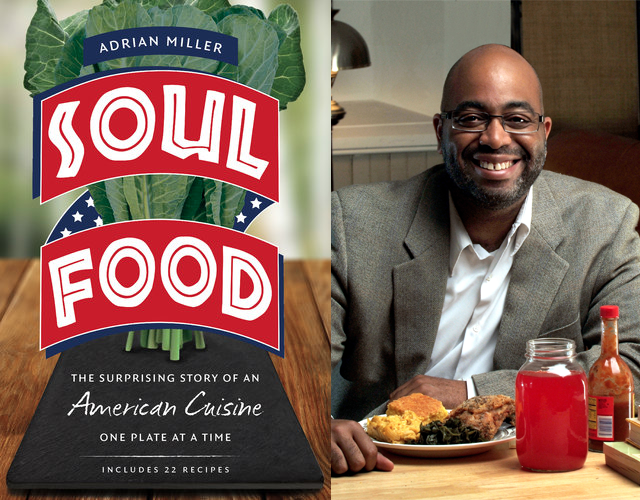The Flavorful Bookshelf: Adrian Miller On The State Of Soul Food
By Melissa McEwen in Food on Jul 29, 2014 6:00PM

“I think the soul food scene in Chicago is quite strong” says Adrian Miller, author of Soul Food: The Surprising Story of an American Cuisine, One Plate at a Time, which recently won a James Beard Award. The soul food scene in Chicago is the culinary legacy of African-Americans who migrated from the South to the Chicago area in the early 20th century as part of the phenomenon known as the “Great Migration.”
Most of them came from Mississippi, Arkansas, and Louisiana. They brought fried chicken, biscuits, caramel cake, salmon patties, and other Southern-rooted foods. Many opened restaurants that served up this cuisine known as soul food and became an integral part of the city’s culinary fabric.
However, in recent years, many classic soul food restaurants like Edna’s Restaurant and Izola’s Family Dining have closed. But Miller says we still have “Overall the best soul food scene in the country– Morrison’s (8131 S. Ashland Ave.), Priscilla's (4330 Roosevelt Rd., Hillside), Ruby’s (3175 W. Madison St.) which is the reincarnation of Edna’s and one that stood out to me but that’s kind of under the radar is Alice’s (5638 W. Chicago Ave.).”
Yet these restaurants rarely feature in the mainstream food media. Miller thinks this is likely caused by two things: that soul food is associated with “poverty food” and that it has a reputation for being unhealthy. In the book he writes “though they come at it from different angles, a number of black activists, community leaders, entertainers, nutritionists, and religious leaders have used their cultural cachet to criticize soul food, while few of the black community’s tastemakers have risen to the cuisine’s defense.”
He says this reputation is largely undeserved. His book explores the complex roots of many soul food staples, revealing many of them actually have luxurious roots.
These include fried chicken, which was once reserved for special Sunday dinners, and macaroni and cheese, which was once an expensive luxury. But these days both can be found cheaply in both classic soul food restaurants and fast food joints. It’s a good and a bad thing, as these foods, like many in the past associated with luxury, are high in refined carbohydrates and fat.
Other foods like greens and catfish are rooted in ancient African foodways. Miller says “with the current state of health in African American community and higher incidences of many chronic diseases, people believe it’s because of traditional foods. That may be part of it, but it’s not the whole story. It’s a scapegoat for larger food system. If you take a look at what nutritionists tell us to eat it includes many traditional soul foods—sweet potatoes, fish, legumes, leafy greens. It comes down to how they are prepared.”
Miller says that diners “should know (soul food) was the earliest fusion cuisines, something very unique. A chance to get a taste of edible history. In response to the criticisms of it being fatty and sugary, a lot of soul food joints do vegan and vegetarian side dishes. They may use smoked meat, but more and more are not using meat. You can find good healthy food. And then you’ve got the glorious stuff as well.”
But many diners don’t know about it at all. It’s not often on the “foodie” radar the way other diaspora cuisines like Thai are. Miller says that with the food media, soul food restaurants are “swimming upstream,” often lacking in marketing and in online presence. It takes a “commitment on the journalist’s part to be vigilant. There are so many restaurants and things going on, it takes a commitment to follow these things until soul food joints do have a strong presence.“
Soul food fans can also help by lending marketing savvy or reviewing their favorites online. “Go to Yelp and Urban Spoon and proactively put good reports. Be as detailed as you can with specific examples.” Miller says "if you have a bad experience at soul food joint, don’t write it off, give it another chance. Lower your expectations- your grandma isn’t in the kitchen. Go in just wanting some good food."
Ultimately he says people ought to try out Chicago’s soul food institutions because “the food is good. And who doesn’t want to have good food?”
Check out Miller’s book Soul Food: The Surprising Story of an American Cuisine, One Plate at a Time.
The Flavorful Bookshelf highlights books about food and drink.